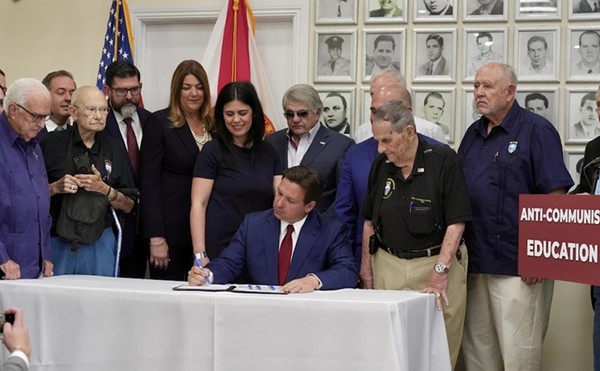At the corner of Rosedale Street and Primrose Drive, three shopping carts of varying corporate origins have apparently outlived their purpose. The trio rests now in a still-life tangle of plastic, metal and adjacent debris atop a storm water grate. It's a mess, and it runs deeper than this street-corner blemish.
Orlando commissioner Patty Sheehan knows that all too well. In recent months she's received a flurry of e-mails and faced a sea of raised hands at neighborhood meetings about shopping carts; nice, homeowning folk have been forced to live beneath the shadow of a shopping-cart mountain.
"Oh my god! It was a fucking huge issue!" says Jason Lowe, founder and former president of the Coytown Neighborhood Association. "Sometimes, literally, there would be 20; 10 on each side of the road. After we put pressure on Winn-Dixie, they would occasionally send people over to retrieve them."
"It was a hazard for drivers," Lowe adds. "People would try to roll them up on the curbs, but sometimes they wouldn't and it would roll out into the road. At nighttime, somebody could easily run into them."
An informal driving tour of downtown and surrounding areas produces evidence of the problem. In a construction site at the corner of Livingston Street and Bumby Avenue, for example, two carts sit on two of the property's corners: one from Winn-Dixie, the other from Target. In a nearby parking lot, a landscaper uses another Target cart as part of his weeding routine, disposing of the refuse into it and rolling it along as he bends over for more.
Around the corner on Hillcrest Street, in the loading area of Phuoc Loc Tho Super Oriental Market, a mass of shopping "carriages" shares space with carts from nearby grocers. Next to the dumpster behind A Antiques Shop, just off Antique Row on New Hampshire Street, a gaggle of Save-A-Lot carts lie blanched with sun damage, wheels pointing to the sky.
The city of Orlando is proposing an ordinance requiring establishments with 20 or more carts to build a "shopping cart retention system." Stores would have to erect a physical barrier to keep carts on premises, install something on the carts themselves that would prevent removal or charge a cash deposit. Such laws are nothing new, and many grocers are already installing the devices to hold on to their property.
Kissimmee put through a similar ordinance in 2002 (it became effective last year). The law, says Kissimmee city manager Mark Durbin, has been a fantastic success.
"It's incredible," Durbin says. "There was one certain stretch of the road where at any given time we could pick up 50 carts; now there's barely any at all. It's made a huge difference. It's just really been a wonderful thing."
The Florida Retail Federation, however, does not share that opinion. The Tallahassee-based lobbying organization represents many large retailers in Florida — among them the major grocery chains — and upon hearing of Kissimmee's ordinance, pursued an injunction. The city appealed and eventually won when a 5th District judge ruled the ordinance constitutional. The judge noted that the ordinance encouraged businesses to maintain their cart pool, and was not an out-and-out punitive fine.
The Federation didn't agree, of course.
"It's a bit much, I think, to say to someone who has had what basically is theft of their property, to be mandated to spend hundreds of thousands of dollars on something that `they're` the victim of," says Rick McAllister, president and CEO of the Florida Retail Federation. "That's the principal issue. What retailers do is they provide conveniences for customers to shop with these carts and in most cases take their groceries to their cars. It was never designed for people to take home with them, to steal and make barbecue pits out of them."
Carts are not cheap; they cost between $100 and $300 each. Some estimates put the cost of cart theft in the $200 million range annually.
Despite the cost of losing carts, retailers are not embracing a law that requires them to corral them.
"If it comes to an issue where it gets out of control, we will give consideration to installing a product that could keep it on property, like the CarTronics," says Dwaine Stevens, Publix media relations manager for Orlando.
Should that become necessary, there are plenty of options, including CAPS (Cart Anti-Theft Protection System), a product of California company CarTronics. CAPS uses a transmitter — like an invisible dog fence — to lock the front wheel of the cart when it approaches a marked boundary. The cost of installation ranges from $25,000 to $30,000 per parking lot, according to Florida Retail Federation executive vice president Randy Miller. That doesn't include the cost of putting the devices on the carts themselves, notes Miller.
"You just add to the cost of the groceries, to any of the goods that we have to provide, when local government puts these restrictions on them," he says. "When the law states very clearly that they can't do it."
Or does it? Following their legal defeat in Kissimmee, the Florida Retail Foundation took its case back to Tallahassee and convinced the legislature to put through some amendments to state law regarding the regulation of carts. Now the pertinent law reads, "Notwithstanding any other provision of law or local ordinance, no fee, fine, or costs may be assessed against the owner of a shopping cart unless the shopping cart was found on public property, and was removed from the premises or parking area of a retail establishment by the owner of the shopping cart, or an employee acting on the owner's behalf, and the fee, fine, or cost has been approved by the Department of Agriculture and Consumer Services."
"It's so poorly written," says Orlando commissioner Sheehan. "The bill, all it does is reiterate the fine thing about removal. We don't want a fine."
Orlando's code enforcement department had been sending out trucks and fining the businesses for cart retrieval, something they are now prevented by law from doing. "We conservatively spend the equivalent of the annual salary of one code enforcement officer, just under $32,000 per year, on the labor (collection) and disposition (tipping fees) of orphaned shopping carts," says Mike Rhodes, manager of code enforcement, via e-mail. "We collect and dispose of 200-300 each month from all over the city."
Orlando's own cart ordinance is currently rattling on a bumpy road. It was scheduled to be reviewed by the City Council July 24th, but was pulled due to legal questions. As written, it's a vast and sweeping bit of legalese dealing with "motorists, pedestrians, cyclists, and other travelers within the City," environmental hazards, and public access to parks and other facilities. Terms like "visual blight," "evidence of urban decay," "community neglect" and "public nuisance" are all contained therein.
What really sends the ordinance over the top, though, is the inclusion of a photo essay depicting carts around town in varying shades of despondence: one rolling into a street, one on a street, one in a trailer park. If the shots were in black and white instead of color they'd have that certain high-lonesome quality of a Depression-era Dorothea Lange composition. One has to wonder how the early shopping cart, first unveiled in 1937, would see its offspring now?
As a footnote, the proposed cart restrictions could find an odd public reception when placed up against the city's (and especially Sheehan's) recent bouts with the feeding of the homeless. After all, who lives out of stolen grocery carts? Is there a chance this could backfire?
"Of course there is," says Sheehan. "Although I have to tell you that that really has nothing to do with it."
Meanwhile, on the side of Mills Avenue at a LYNX bus stop, a lone cart lies on its side, empty. It's done nothing, really. And it's going nowhere.
[email protected]


















